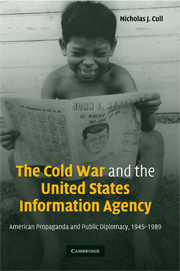 The Cold War and the United States Information Agency
The Cold War and the United States Information Agency Book contents
- Frontmatter
- Contents
- List of Illustrations
- Preface
- Abbreviations
- THE COLD WAR AND THE UNITED STATES INFORMATION AGENCY
- Prologue
- 1 Getting the Sheep to Speak
- 2 Mobilizing “the P-Factor”
- 3 In the Shadow of Sputnik
- 4 Inventing Truth
- 5 Maintaining Confidence
- 6 “My Radio Station”
- 7 Surviving Détente
- 8 A New Beginning
- 9 From the “Two-Way” Mandate to the Second Cold War
- 10 “Project Truth”
- 11 Showdown
- Epilogue
- Conclusion
- Selected Bibliography
- Index
- Plate section
2 - Mobilizing “the P-Factor”
Eisenhower and the Birth of the USIA, 1953–56
Published online by Cambridge University Press: 05 February 2015
- Frontmatter
- Contents
- List of Illustrations
- Preface
- Abbreviations
- THE COLD WAR AND THE UNITED STATES INFORMATION AGENCY
- Prologue
- 1 Getting the Sheep to Speak
- 2 Mobilizing “the P-Factor”
- 3 In the Shadow of Sputnik
- 4 Inventing Truth
- 5 Maintaining Confidence
- 6 “My Radio Station”
- 7 Surviving Détente
- 8 A New Beginning
- 9 From the “Two-Way” Mandate to the Second Cold War
- 10 “Project Truth”
- 11 Showdown
- Epilogue
- Conclusion
- Selected Bibliography
- Index
- Plate section
Summary
It is not enough for us to have sound policies, dedicated to the goals of universal peace, freedom and progress. These policies must be made known to and understood by all peoples throughout the world.
Dwight D. Eisenhower, 30 July 1953.President Eisenhower took office with an unequivocal pledge to wage the Cold War. “Freedom,” he declared in his inaugural address, “is pitted against slavery, lightness against the dark.” Although he soon backed away from early talk of actually liberating the Communist bloc, Eisenhower worked consistently to reinvigorate U.S. information. As a soldier he had learned the value of the psychological dimension of power – “the P-factor” as he called it – on the battlefield. As President he promptly launched two inquiries into U.S. information overseas: the President's Committee on International Information Activities, chaired by William H. Jackson, and the President's Advisory Committee on Government Organization, chaired by Nelson Rockefeller. Meanwhile, the Senate Foreign Relations Committee continued its investigation of information initiated by Benton and chaired by Fulbright under the new chairmanship of Bourke Hickenlooper (R-IA). The net result of these three committees would be the creation of the United States Information Agency in August 1953.
The idea that information needed an independent agency came from three key sources: Eisenhower's adviser on matters of propaganda, C. D. Jackson; Nelson Rockefeller; and the new Secretary of State, John Foster Dulles.
- Type
- Chapter
- Information
- The Cold War and the United States Information AgencyAmerican Propaganda and Public Diplomacy, 1945–1989, pp. 81 - 133Publisher: Cambridge University PressPrint publication year: 2008


